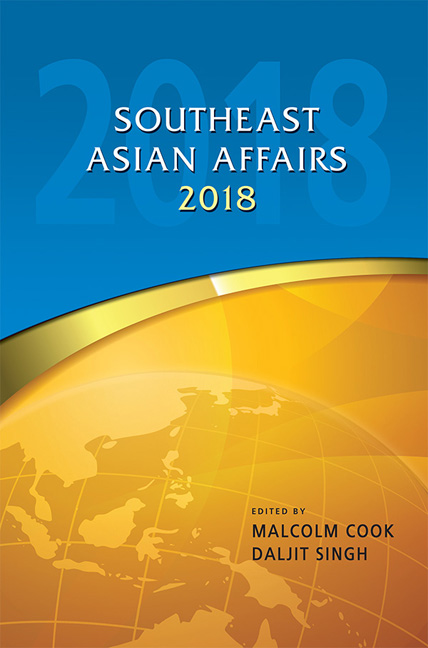Book contents
- Frontmatter
- Contents
- Introduction
- Acknowledgements
- THE REGION
- BRUNEI DARUSSALAM
- CAMBODIA
- INDONESIA
- Inequality, Nationalism and Electoral Politics in Indonesia
- Indonesia in 2017: Jokowi's Supremacy and His Next Political Battles
- LAOS
- MALAYSIA
- MYANMAR
- THE PHILIPPINES
- SINGAPORE
- THAILAND
- TIMOR-LESTE
- VIETNAM
Inequality, Nationalism and Electoral Politics in Indonesia
from INDONESIA
Published online by Cambridge University Press: 08 June 2019
- Frontmatter
- Contents
- Introduction
- Acknowledgements
- THE REGION
- BRUNEI DARUSSALAM
- CAMBODIA
- INDONESIA
- Inequality, Nationalism and Electoral Politics in Indonesia
- Indonesia in 2017: Jokowi's Supremacy and His Next Political Battles
- LAOS
- MALAYSIA
- MYANMAR
- THE PHILIPPINES
- SINGAPORE
- THAILAND
- TIMOR-LESTE
- VIETNAM
Summary
As election season looms, President Joko Widodo's (Jokowi) political opponents have begun to craft their campaign message. From mid-2017, Prabowo Subianto, Jokowi's closest rival, made an increasing number of public appearances. Campaignstyle videos started to appear with greater frequency on his party's (Gerindra) social media pages. Gerindra's twitter profile, for example, was filled with content about economic inequality, emphasizing to followers that the richest 1 per cent of Indonesians own 49 per cent of the country's wealth. In one video, posted in November 2017, Prabowo blames Indonesia's worsening economic inequality on a political elite who have abandoned the egalitarian spirit of Indonesia's 1945 Constitution. Meanwhile, senior members of Gerindra, along with Jokowi's other detractors from Partai Keadilan Sejahtera (PKS), and conservative Islamic groups, accuse the Jokowi government of providing economic privileges to foreign business interests and Indonesian Chinese tycoons. Indonesia's Muslim masses, they intimate, have been excluded and left behind.
These claims of economic injustice, whether real or imagined, are typical of a populist political style. Prabowo ran on a similar platform during the 2014 presidential race, and lost. So, how vulnerable is Jokowi to this kind of narrative? To what extent might such nationalist and populist appeals have more traction with the electorate in 2019 than they did in 2014? Are exclusivist electoral campaigns and nationalist economic agendas becoming a permanent fixture of post-Suharto politics?
This chapter attempts to address these questions. It begins with a brief overview of populist politics and economic nationalism in the Indonesian context. It then progresses in three sections, each of which explores a major line of critique put forward by Jokowi's political rivals: (1) growth, foreign investment and the China problem; (2) resource nationalism and food sovereignty; and (3) socio-economic inequality. It argues that Jokowi's economic record has been mixed over the past three years, which exposes him to technocratic critiques about missed economic targets and poor policy execution. But he is also vulnerable to populist-nationalist attacks, which exaggerate the president's closeness to China and Indonesian Chinese tycoons and question his commitment to the prosperity of the ummah. In a fourth section, I look at Jokowi's attempt to adjust his economic message and undercut these critiques. The chapter closes by reflecting on scholarly debate about the conditions which have produced an upswing in populist politics and economic nationalism in Indonesia.
- Type
- Chapter
- Information
- Southeast Asian Affairs 2018 , pp. 135 - 152Publisher: ISEAS–Yusof Ishak InstitutePrint publication year: 2018

